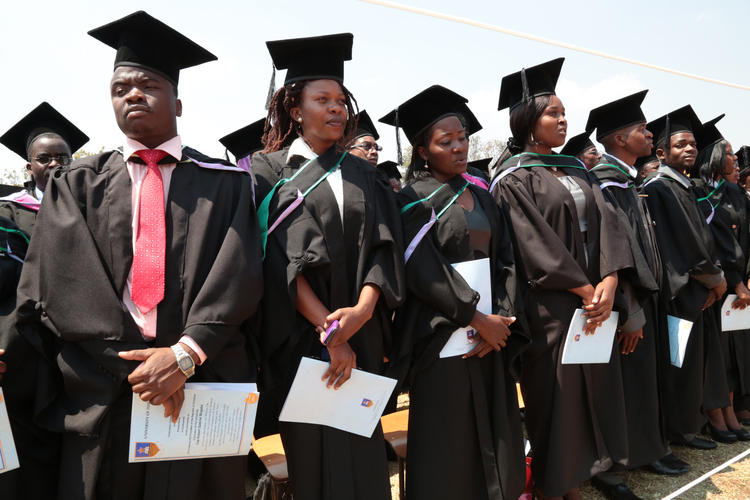
The Sunday Mail

Farmers and educationists have hailed President Mugabe for assenting to the Marondera Agricultural Sciences and Technology Act which will pave way for the establishment of the country’s first specialist university in agriculture.
In terms of the Act, one of the objectives of the university is to specialise in agricultural sciences and technology and the

Specialist universities enable tertiary learners to do in-depth studies
advancement of knowledge through teaching, research and learning. Although there are already a number of technical colleges and agricultural departments at existing universities, experts anticipate that the introduction of a specialist university will give a new dimension to the country’s agrarian reform. While logistical details of how the university will be set up are still hazy, The Sunday Mail Extra has gathered that the hiring of staff and the development of the institution’s infrastructure in Marondera is already at an advanced stage. Specialist universities enable tertiary learners to do in-depth studies and research on a particular subject, thereby enhancing their knowledge on specific matters, a situation that can create perfection. With Zimbabwe’s economy anchored on agriculture, some observers are of the opinion that the establishment of a university of this kind was long overdue. Educationist and lecturer in the Department of Technical Education at University of Zimbabwe, Dr Peter Kwaira said the institution will also enhance the gains of the land reform programme.
“Specialisation always brings perfection because whatever you are studying, you are not being narrow. Agrarian reform is the turning point in the country’s socio-economic development and you need this kind of institution to go with it,” he said.
“It is a new dimension which brings a new breed of entrepreneurs, not just people who take up agriculture as a hobby but as a profession. Students will have much more depth in their studies and that is a good thing.”
Dr Kwaira went further to suggest that agricultural theoretical learning should start at Early Childhood Development (ECD), saying this will help pupils understand better the link between the food they buy in shops and its production at the farm. Many black farmers acquired farming land at the height of the fast-track land reform programme but most of them still need to acquire the necessary knowledge and skills in order to become successful.
As a result, the farming sector has not been performing to the maximum, particularly in food production. However, the great potential can be unlocked through the establishment of the agricultural university. Researchers say harnessing sciences and technology in the agricultural sector will cut costs of production and production times. Zimbabwe Commercial Farmers Union (ZCFU) president, Mr Wonder Chabikwa said one of the reasons why the cost of production is high in Zimbabwe is the lack of modern technology.
“We already have colleges specialising in agriculture such as Gwebi and Chibero. We also have agricultural departments at existing universities but having a university will be key for technological transformation in our agriculture sector,” he said.
“The institution should deal with things to do with modern irrigation and modern land preparation. We also have soil pH being detected by satellite these days so technological inclusion in agricultural studies is an area that this university should deal with. To support this notion, research expert and lecturer in the Department of Agricultural Engineering at Chinhoyi University of Technology, Mr Washington Muzari said the need for technology in modern farming is unparalleled. He said small-holder farmers are the ones who particularly need technology.
“Experience and evidence from countries within and around the sub-Saharan African region indicate that returns to agricultural technology development could be very high and far-reaching,” he said.
The factors affecting technology adoption are assets, income, institutions, vulnerability, awareness, labour, and innovativeness by smallholder farmers. Technologies that require few assets, have a lower risk premium, and are less expensive. They have a higher chance of being adopted by smallholder farmers,” he said.
Mr Muzari said there are certain traditional smallholder agricultural technologies in sub-Saharan Africa that also have their own merits. Some of these technologies, he said, are more efficient in their use of scarce production resources than modern technologies. “Modern researchers should therefore, seek to understand the rationale behind traditional smallholder farmer behaviour in technology use. This will make their future technological interventions in smallholder agriculture more effective,” he said.
Higher and Tertiary Education, Science and Technology Development Deputy Minister, Dr Godfrey Gandawa said the university is already operating under the support of the University of Zimbabwe.
“The university has already been running under the surrogacy of the University of Zimbabwe at a site in Marondera. We have already built lecture rooms, we have acquired farms and so far everything is going as planned. Bearing in mind the fact that our economy is agro-based, this university will be unique in the fact that it will specifically deal with the inclusion of sciences and technology in farming so it will go a long way in boosting agriculture in the country,” he said.
Dr Gandawa said the university’s main campus will be located in Marondera town. The establishment of a university in Marondera will bring the number of state higher learning institutions in the country to nine and partially fulfills the objective of having such institutions in all provinces. At the attainment of independence in 1980, Zimbabwe only had one university, that is the University of Zimbabwe.



